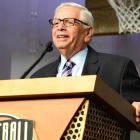David Stern, the former commissioner of the NBA, has died at 77 after suffering a brain hemorrhage in December, the league announced Wednesday.
Stern was the commissioner of the NBA from 1984 through 2014, presiding over a period of immense growth for professional basketball at a time in which its popularity was significantly lower than it is today. At the beginning of his tenure, the NBA Finals were still being aired on tape delay. By the time he stepped down, the league had become a financial powerhouse and one of the most widely viewed sports in the world.
Among his greatest accomplishments as commissioner was the grooming of his eventual successor, Adam Silver, who is among the most popular executives in the history of sports. The financial foundation that Stern helped created has allowed Silver to pursue a number of creative initiatives that the league didn't have the resources to consider in the past, including a mid-season tournament that could be instituted in the near future. Silver released the following statement on Stern's legacy within the league.
"For 22 years, I had a courtside seat to watch David in action. He was a mentor and one of my dearest friends. We spent countless hours in the office, at arenas and on planes wherever the game would take us. Like every NBA legend, David had extraordinary talents, but with him it was always about the fundamentals — preparation, attention to detail, and hard work."
"David took over the NBA in 1984 with the league at a crossroads. But over the course of 30 years as a Commissioner, he ushered in the modern global NBA. He launched groundbreaking media and marketing partnerships, digital assets and social responsibility programs that have brought the game to billions of people around the world. Because of David, the NBA is a truly global brand — making him not only one of the greatest sports commissioners of all time but also one of the most influential business leaders of his generation."
"Every member of the NBA family is the beneficiary of David's vision, generosity and inspiration. Our deepest condolences go out to David's wife, Dianne, their sons, Andrew and Eric, and their extended family, and we share our grief with everyone whose life was touched by him."
The NBPA, with whom he battled constantly during CBA negotiations and four lockouts, also released a statement on Stern.
"The entire basketball community is heartbroken. David Stern earned and deserved inclusion in our land of giants. His impact on our game and our business is immeasurable and the rewards we reap will continue to be appreciated by the NBA players and their families for generations. As tough an adversary as he was across the table, he never failed to recognize the value of our players, and had the vision and courage to make them the focus of our league's marketing efforts - building the NBA into the empire it is today. We owe him and we will miss him."
Stern, arguably one of the most important figures in the history of professional basketball, joined the league as its general counsel in 1978, and helped institute the league's salary cap before being promoted to commissioner in 1984. The NBA was the first North American sports league to institute a salary cap, and would not be followed until the NFL did so in 1994. As commissioner, he spearheaded a number of initiatives that helped transform the league into what it is today.
Among his most important accomplishments was turning the NBA into a television powerhouse. Even the NBA Finals struggled to garner an audience when he took over the league, and it was even showed on tape delay, but Stern brokered several enormous broadcasting deals -- first with NBC, then with ESPN and TNT -- that helped popularize the sport nationwide. Viewing numbers peaked in the 1990s, at the height of Michael Jordan's popularity, which Stern used to help make the NBA a global sport.
Stern was one of the driving forces behind the 1992 Dream Team, which was the first Olympic roster to feature NBA players. Jordan, Magic Johnson and Larry Bird led Team USA to the gold medal in Barcelona, but the true impact of their presence came in introducing foreign fans to the game. The proliferation of international players in the NBA is a key element of Stern's legacy. Stern's decision to play exhibition games on foreign soil still lasts to this day, and has even been expanded to include regular-season games.
That international emphasis even led to two NBA teams being formed in Canada. While the Vancouver Grizzlies eventually moved to Memphis, the Toronto Raptors remain as Canada's favorite team. It is only fitting that they would be the last champion Stern got to see. All told, Stern took over a league with 23 teams and pushed it to 30. A number of other new markets were granted teams through relocation, including Sacramento, Brooklyn and Oklahoma City.
Growth was the defining feature of Stern's tenure, and not just in terms of the NBA itself. He was also the founder of the WNBA in the 1990s, and one of its great champions despite early financial struggles. WNBA commissioner Cathy Engelbert released the following statement about Stern's impact on her league:
"We are deeply saddened by the passing of NBA Commissioner Emeritus David Stern. The WNBA will be forever grateful for his exemplary leadership and vision that led to the founding of our league. His steadfast commitment to women's sports was ahead of its time and has provided countless opportunities for women and young girls who aspire to play basketball. He will be missed."
Despite his considerable positive impact on the game, Stern's tenure was not without its controversies. He led the league through four lockouts, and his stewardship of the then-New Orleans Hornets as a league-owned team following that final lockout in 2011 led to one of the most hotly-debated decisions any commissioner has ever made.
When Hornets general manager Dell Demps attempted to trade star point guard Chris Paul to the Los Angeles Lakers, Stern stepped in and vetoed the deal, citing "basketball reasons" as his motivator in doing so. This decision was hailed by small-market fans following a flood of superstars leaving their original teams in free agency for bigger cities. Others, however, questioned whether or not it was the commissioner's place to make such a decision, even as the acting owner of a team. Paul was ultimately traded to Los Angeles either way, but to the Clippers, not the Lakers.
Stern also instituted a controversial dress code in 2005. The decision was made in the hopes that a cleaner image, particularly following the brawl between the Indiana Pacers and Detroit Pistons that spilled into the stands a year earlier, would help make the players more marketable. While there was push-back at the time, the decision ultimately led to players making fashion a key element of their brand.
Such decisions are ultimately emblematic of Stern's legacy. He was willing to make unpopular decisions for the sake of the league, and while not all of them worked as anticipated, the NBA is far better off for having been led by Stern. He will be sorely missed by the entire basketball world and remembered as the perhaps the single-most important person in making the NBA what is today.






















